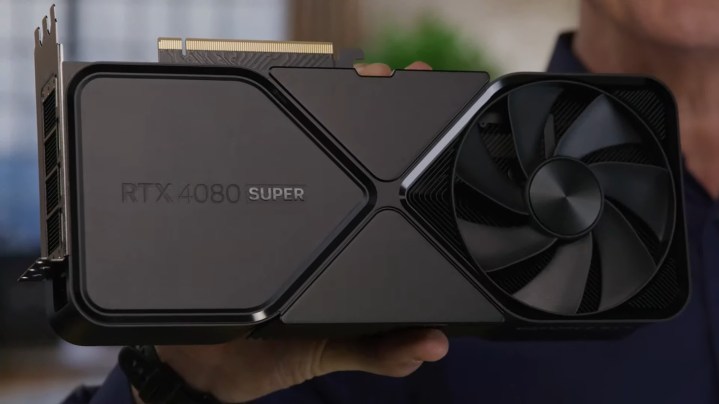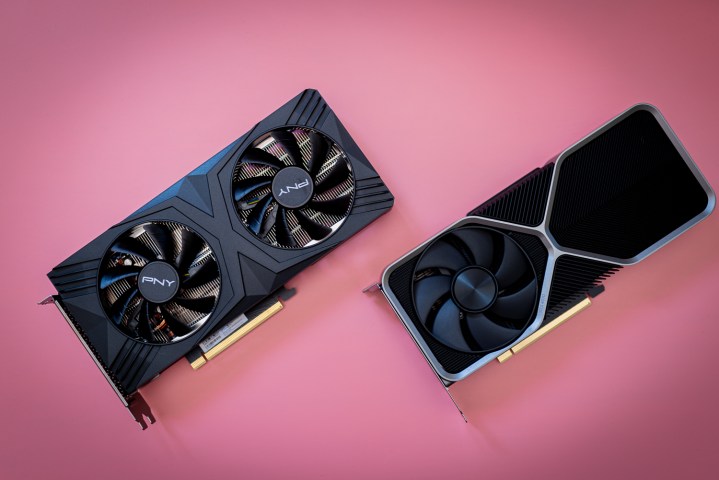
I’m floored. We all knew that Nvidia was releasing new Super graphics cards at CES 2024, but I never expected Nvidia to drop the price with the release of the RTX 4080 Super. The updated model, which will replace the RTX 4080 that released at $1,200, is arriving for $1,000. Nvidia has been the primary driving force behind high GPU prices, but the RTX 4080 Super is a strange change of course that actually brings prices down.
A big reason why is that the RTX 4080 Super isn’t too different from the RTX 4080. It’s using the same AD103 GPU, but it comes with the full die, equaling 10,240 CUDA cores. It’s just a 5% bump over the base model, and the Super version comes with the same 16GB of GDDR6X memory and the same 320 watts of power draw.
It’s less of a Super refresh and more of a price cut, and that’s not a bad thing. At release, the RTX 4080 was one of the worst values you could find on a GPU. Now, it’s far more competitive, taking the fight to AMD’s RX 7900 XTX with DLSS 3.5 and far better ray tracing performance.
| RTX 4070 Super | RTX 4070 Ti Super | RTX 4080 Super | |
| GPU | AD104 | AD103 | AD103 |
| Interface | PCIe 4.0 | PCIe 4.0 | PCIe 4.0 |
| CUDA cores | 7,168 | 8,448 | 10,240 |
| Boost clock | 2,475MHz | 2,610MHz | 2,505MHz |
| Memory | 12GB GDDR6X | 16GB GDDR6X | 16GB GDDR6X |
| Memory speed | 21 Gbps | 21 Gbps | 23 Gbps |
| Memory bus | 192-bit | 256-bit | 256-bit |
| TDP | 220W | 290W | 320W |
As for performance upgrades, Nvidia isn’t making bold claims. The company tells me it expects improvements over the RTX 4080 in the low single digits. Some games may be as much as 5% faster, while others will see no improvement at all. On average, Nvidia says it expects performance improvements around 2% to 3% over the RTX 4080.
Of course, we’ve known for a while that Nvidia is launching three Super GPUs. In addition to the RTX 4080 Super, we have the RTX 4070 Ti Super and RTX 4070 Super. These latter two GPUs retain the list price of their non-Super counterparts at $800 and $600, respectively, but they come with a big boost to specs.
The RTX 4070 Ti Super will replace the RTX 4070 Ti, but it’s getting an upgrade to the AD103 GPU like the RTX 4080. This one is cut down with 8,448 CUDA cores, and Nvidia says this GPU is about 10% faster than the RTX 4070 Ti on average. The company was careful to point out that this is an average, however. Some games could see as much as a 15% jump.
Outside of a core bump, the other big upgrade for the RTX 4070 Ti Super is 16GB of GDDR6X memory. It now comes with the same memory subsystem as the RTX 4080, giving the $800 graphics card a lot room to breathe when it comes to 4K gaming.

Finally, the GPU I’m most excited about: the RTX 4070 Super. I’ve been very vocal about the RTX 4070 being a fantastic graphics card, but Nvidia is making it even better. A 20% bump in core count means that it’s 15% faster than the base RTX 4070 on average, according to Nvidia. And it’s coming in at the same $600 price.
With the updated specs, the RTX 4070 Super is just a stone’s throw away from the base RTX 4070 Ti. In fact, Nvidia says the new Super model is just 5% slower than the RTX 4070 Ti while costing $200 less. On top of that, Nvidia says the RTX 4070 Super is faster than an RTX 3090 — a GPU that released for $1,500 — and that’s without any frame generation shenanigans.
Interestingly, this is the only Super model that won’t replace its non-Super counterpart. The RTX 4070 Super will live alongside the RTX 4070. However, Nvidia is officially cutting the price of the RTX 4070 to $550, and I suspect that most RTX 4070 models will drop even lower.
We don’t get all three GPUs right away. Nvidia is gradually rolling them out. The RTX 4070 is first, launching on January 17, followed by the RTX 4070 Ti Super on January 24. Finally, the RTX 4080 Super will release on January 31. Only the RTX 4070 Super and RTX 4080 Super are getting Founder’s Edition designs, but all three GPUs will have models available at list price, according to Nvidia.
Editors’ Recommendations

